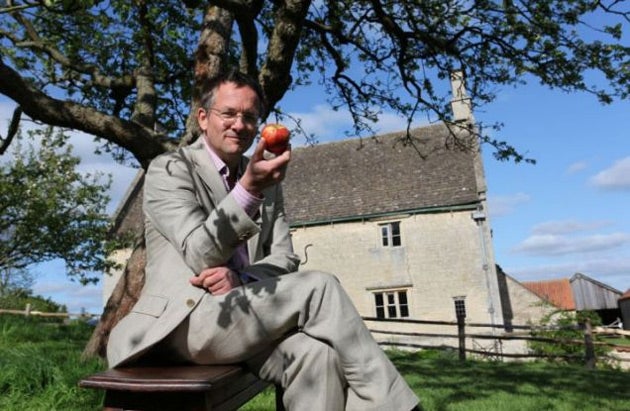Last Night's TV - The Story of Science, BBC2; La La Land, BBC3; True Stories: Vote Afghanistan!, More4
The real masters of the universe

There are some great questions that have intrigued and haunted us since the dawn of humanity," said Michael Mosley at the beginning of The Story of Science. "What is out there? How did we get here? What is the world made of?" To which I added another one: "What exactly is BBC2 up to?" Hard on the heels of Seven Wonders of the Solar System, an entire series about cosmology, we get a new series about science that looks as if it aims to wrap up the journey from geocentric universe to Big Bang in just one episode, and that's not allowing for the interminable adverts for themselves with which these television part-works are obliged to begin. Patience, though, because somewhere in there, buried among the grandiose rhetorical questions and the encyclopaedia salesman preamble there is a rationale. This is, it seems, a kind of counter-history of science, one that will acknowledge the accidents and the impurities that helped pave the way to our modern understanding of the world. Or, as Mosley put it: "This is the story of how history made science and science made history."
It may have been a little optimistic to expect a serious stab at epistemology in prime time, even on BBC2. If you were hoping for that, or a real attempt to get to grips with the philosophy of science (I know how high-minded you can be) then you would have been disappointed. Because what we got instead was a fairly straightforward timeline history, well supplied with basic explanations and colourful anecdote (we got Tycho Brahe's drunken pet elk and Galileo's scramble to cash in on the telescope), but unlikely to scramble any basic assumptions about how science operates. Then, as now, nothing gets done without funding, and as often as not the motive for stumping up the money doesn't match the results you get. Rudolf II bankrolled Brahe and Johannes Kepler because he wanted his astrological readings to be more accurate, not because he had a pure commitment to blue-skies research. And personal ambition should never be underestimated as a motor for scientific advancement. Newton had been sitting on the essential ideas contained in Principia Mathematica for some 20 years, before a visit from Edmond Halley finally goaded him into actually doing something about it. I still can't entirely work out how we got from Newton to Edwin Hubble in one hyper-space leap, but my hypothesis is that there simply wasn't time to tell us everything that happened in between. Further data required, but I'd prefer it if you made the observations.
You might think that Sacha Baron Cohen had queered the pitch for ambush television in the States, making people so wary of foreign television crews that it would be impossible to successfully pull off a spoof documentary. If you go where deranged self-regard and narcissism is the norm, however, you still stand a fighting chance. In La La Land, Marc Wootton has done just that. He plays three expatriate Brits hoping to make their mark in Hollywood, and films his encounters with various unwitting stooges who make a living by servicing the egos of the ambitious. We've seen one of the characters before – Shirley Ghostman, a camp television medium who has arrived in Los Angeles fleeing police charges in England. The logic of his back story didn't entire make sense, but it was still funny to see the brisk professionalism of the publicity agent he was consulting, as she fished helplessly through the wreckage of his recent CV trying to find an upside. Also hoping to build a career are Gary, an Essex geezer who thinks he's the next Jason Statham because everyone looks at him in the pub back home and Brendan Allen, a bearded documentary-maker. The stooges, incidentally, mostly come off with their dignity intact, quickly recognising that Wootton's characters are absolute idiots and in most cases telling them so, but with a degree of exasperation that suggests they haven't twigged that it's wind-up. The funniest moment was the long sequence in which Brendan doggedly tried to pitch an "innovative" shark documentary using underwater cameras, reacting to the tactful explanation that this had been done many times before as a failure to grasp the novelty of his suggestion: "No, no... I don't think you understand what I'm saying," he explained patiently, "we'd be underneath... you know, below where the boats are." There was strong competition for that top spot though, largely because of the detail and nimbleness of Wootton's characterisations. It's genuinely funny.
The recent Afghan elections weren't, though there was what I take to be an unintentional comedy to the opening of True Stories documentary on the subject, Vote Afghanistan!, which featured an elderly goatherd crooning a melancholy dirge, accompanied by subtitles that may not have captured all the lyric grace of the original. "Everything makes me leave my own people and go far away..." he sang. "Oh my God... Are you aware it is very, very expensive for the poor... Oh my God... The farmer sets the unaffordable prices, that makes me want to die." Anyone who made it past this deeply un- seductive opening will have found an instructive – even chastening – film about a place where democracy demands much more of its acolytes than a lot of late nights delivering leaflets. It also demonstrated that Afghani vox pops are no more illuminating than British ones. "They are all as bad as each other," moaned one elderly Kabul man. I think the subtitle got every nuance there.
Subscribe to Independent Premium to bookmark this article
Want to bookmark your favourite articles and stories to read or reference later? Start your Independent Premium subscription today.

Join our commenting forum
Join thought-provoking conversations, follow other Independent readers and see their replies